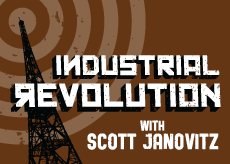Industrial Revolution: The Soundtrack Remains The Same
posted in: Features
 Ah, the soundtrack. The personal heavy-rotation staple or the CD that’s keeping company with unlabeled mystery CD-Rs, the free magazine compilations or your friend’s band’s terrible demo”all filed somewhere after Misc. ˜Z’. You’d like to sell or toss them, but it was an awesome movie. And it does have that one great song you can’t find on any other album.
Ah, the soundtrack. The personal heavy-rotation staple or the CD that’s keeping company with unlabeled mystery CD-Rs, the free magazine compilations or your friend’s band’s terrible demo”all filed somewhere after Misc. ˜Z’. You’d like to sell or toss them, but it was an awesome movie. And it does have that one great song you can’t find on any other album.
Whether gold or garbage, if you have a couple of soundtracks in your collection, you are not alone. Film and television soundtracks have been a constant in a market that has seen many ups and downs, but which now seems to be on a steady decline. Record sales overall have now slipped beyond the point of reasonably being termed flagging and are really in full cardiac arrest. Yet music consumers continue to boost soundtracks into the solid sales stratosphere. At press time, there are six soundtrack albums among Billboard’s Top 50 albums. This is a historical trend. Certainly, not all soundtracks sell. In fact, many fail dismally. But every generation has a few landmark, bona fide blockbuster soundtracks that top the charts, regardless of their contemporary sales trends. Since the ’20s and ’30s, when Charlie Chaplin began composing the scores to his hugely popular films, soundtracks have been in demand. In the last few decades, soundtracks to Hair, Grease, Saturday Night Fever, Back To The Future, Purple Rain, The Big Chill, Top Gun, Footloose, Dirty Dancing, Reservoir Dogs, Forrest Gump, Titanic, 8 Mile, and the biggest selling soundtrack ever, The Bodyguard, have sold millions of units each. Some have been so successful as to spawn sequels (Dirty Dancing, Trainspotting, Dazed and Confused, Juno). A sequel to a soundtrack, what will they think of next?
Dirty
These albums and the films they accompany are truly cultural moments, for better or worse. Multiple and diverse factors have contributed to their success, but in any case, they struck a chord in the cultural consciousness. For the fan, the soundtrack to a film or show has always been a way to extend the positive emotional charge they got from the overall experience. The best of these albums offer that emotional connection, along with exclusivity (unavailable material), and a cohesive flow that makes them worth revisiting. But how do we account for their continued sales power in a time when the public is not just tightening the collective belt, but in fact being weaned off the concept of having to pay for music at all?
Dirtier
A look at some recent best-selling soundtracks gives a hint: Glee, Twilight, High School Musical¦ yes, indeed, the answer lies with the tweens. This crowd not only feels the emotional connection to their favorite movies and shows more intensely than other demographics might, but they also remain blissfully, crucially unconcerned with cost. All they have to spend money on in this world are CDs, books, posters, etc. These are not luxury buys for them. They are the important things, and they are all purchased for them. Thus they have no need or interest in pirated material.
Dirtiest
In our increasingly media-saturated and obsessed culture, it will go on like this. The greatest media successes will be those that achieve¦wait for it¦synergy. The book, the movie, the soundtrack, the lunchbox and the bath towel” the combination of these things builds interest into passion into phenomenon. The comparatively measly CD of (yawn) a band’s songs just can’t compete. The big studios and record companies are catching on.
